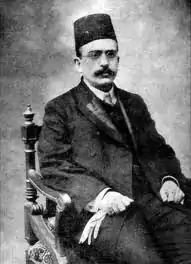Abd al-Masih al-Antaki
Abd al-Masih bin Fath Allah al-Antaki (Arabic: عبد المسيح بن فتح الله الأنطاكي ALA-LC: ʻAbd al-Masīḥ bin Fatḥ Allāh al-Anṭākī; 1874[1]–1923[1]), also referred to as Abd al-Masih Antaki Bey al-Halabi[lower-alpha 1], was a Syrian intellectual, journalist and political activist[2] of the late Nahda (Arab renaissance). He founded periodicals in Aleppo and in Cairo.
Abd al-Masih al-Antaki | |
|---|---|
عبد المسيح الأنطاكي | |
 Antaki in 1907 | |
| Born | 1874[1] |
| Died | 1923 (aged 48–49)[1] |
| Occupation | journalist |
Life
Abd al-Masih al-Antaki was born in Aleppo, Ottoman Syria,[1] to a prominent middle-class Aleppine family.[3] He was Eastern Orthodox.[4] He went to university in France then returned to Aleppo.[3]
In 1897, Antaki founded the magazine Ash-Shudhūr (الشذور 'The Fragments') in Aleppo.[3] It appeared twenty years after an earlier Aleppine magazine, Ash-Shahbāʼ (الشهباء 'The Gray [nickname of Aleppo]').[5] According to Reilly, "like al-Shahba its tone was didactic, but Antaki (unlike al-Shahba) saw modern Europe and particularly France as a model for an idealized concept of modernity – middle class, 'rational,' and largely free of internal contradictions and tensions.[5] Quoting Keith David Watenpaugh, Antaki advocated in his essays "a 'scientific' approach to household management and encouraged the systematic education of women and girls in home economics."[6] According to Watenpaugh, "a recurrent theme in al-Antaki's essays and those he digested from other Arabic publications and European literature is the clear valuation of things Western as inherently superior."[6]
Quoting Philipp, Antaki was "involved in Damascus in the fight for the appointment of an Arabic-speaking Patriarch for the Greek Orthodox community there."[7]
Antaki later relocated to Cairo, where journalists were less at risk of being censored.[8] There, he started the periodical Al-ʻUmrān (العمران) in 1902.[9]
Antaki revised and prefaced an edition of Francis Marrash's Ghabat al-haqq which was printed in Cairo in 1922.[10]
Antaki died in Egypt.[1]
Writings
- Nayl al-Amānī fī d-Dustūr al-ʻUthmānī (نيل الأماني في الدستور العثماني)
- An-Nahḍa sh-Sharqiyya (النهضة الشرقية 'The Eastern Renaissance')
- Dīwān ʻUrf al-Khizām fī Maʼāthir as-Sāda l-Kirām (ديوان عرف الخزام في مآثر السادة الكرام)
- Ad-Durar al-Ḥisān fī Manẓūmāt wa-Madāʼiḥ Mawlānā Muʻizz as-Salṭana Sardār Arfaʻ Sumuww ash-Shaykh (الدرر الحسان في منظومات ومدائح مولانا معز السلطنة سردار ارفع سمو الشيخ)
- (with Khazʻal Khān [amir of Muḥammara]): Manẓūmāt wa-madāʼih ash-Shaykh Khazʻal Khān (Cairo: Maṭbaʻat al-ʻArab, 1326 H. = 1908 M.)
- (with Karīm Khalīl Thābit and ʻAbd ar-Raḥmān al-Kawākibī): Nujūm az-zuhr fī rusūm aʻyān Miṣr (Maṭbaʻat Jarīdat Miṣr, 1905)
- Riḥlat as-Sulṭān fī riyāḍ al-Baḥrayn (Maṭbaʻat at-Tawfīq, 1916)
- Shahīd al-jaljala (Cairo: Idārat Jarīdat al-ʻUmrān, 1904)
- Tārīkh shiʻrī li-ṣadr al-Islām (Cairo: Maṭbaʻat Raʻmasīs, 1338 H. = 1920 M.)
References
- Al-Ḥimṣī 1925, p. 100
- Philipp 1985, p. 133
- Watenpaugh 2014, p. 44
- Philipp 1985, p. 133: "a Greek Orthodox"
- Reilly 2018, p. 79
- Watenpaugh 2014, p. 46
- Philipp 1985, p. 133
- Watenpaugh 2014, p. 47
- Ṭarrāzī
- Hawi 1982, p. 58; Wielandt 1992, p. 124
Sources
- Al-Ḥimṣī, Qusṭākī (1925). Udabāʼ Ḥalab dhawū al-athar fī al-qarn al-tāsiʻ ʻashar أدباء حلب ذوو الأثر في القرن التاسع عشر. Al-Maṭbaʻah al-Mārūnīyah. OCLC 745233703.
- Hawi, Khalil S. (1982). Kahlil Gibran: his Background, Character, and Works (2nd ed.). Third World Centre for Research and Publishing. ISBN 978-0-86199-011-5.
- Philipp, Thomas (1985). The Syrians in Egypt, 1725–1975.
- Reilly, James A. (2018). Fragile Nation, Shattered Land: The Modern History of Syria.
- Ṭarrāzī, Fīlīb dī. Tārīkh al-ṣiḥāfah al-ʻArabīyah تاريخ الصحافة العربية (in Arabic). Al-Maṭbaʻah al-adabīyah.
- Watenpaugh, Keith David (2014). Being Modern in the Middle East: Revolution, Nationalism, Colonialism, and the Arab Middle Class.
- Wielandt, Rotraud (1992). "Fransis Fathallah Marrashs Zugang zum Gedankengut der Aufklärung und der französischen Revolution". In van Gelder, Geert Jan; de Moor, Ed (eds.). The Middle East and Europe: Encounters and Exchanges (in German). Rodopi Publishers. ISBN 978-90-5183-397-3.